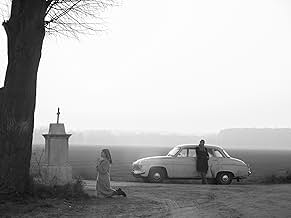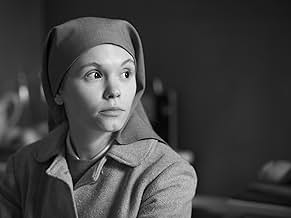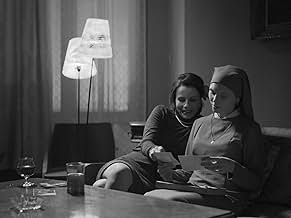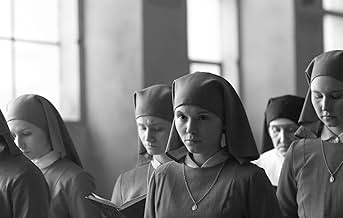Ida
- 2013
- Tous publics
- 1h 22m
IMDb RATING
7.4/10
62K
YOUR RATING
A novice nun about to take her vows uncovers a family secret dating back to the German occupation.A novice nun about to take her vows uncovers a family secret dating back to the German occupation.A novice nun about to take her vows uncovers a family secret dating back to the German occupation.
- Director
- Writers
- Stars
- Won 1 Oscar
- 70 wins & 92 nominations total
Natalia Lange
- Bronia
- (as Natalia Lagiewczyk)
Jan Wojciech Poradowski
- Father Andrew
- (as Jan Wociech Poradowski)
- Director
- Writers
- All cast & crew
- Production, box office & more at IMDbPro
Featured reviews
In the 60's Poland, a few days before pronouncing her vows of poverty, chastity and obedience to end her probation period and officially become a nun, Anna, an orphaned young woman, learns by chance the existence of her aunt, Wanda. The Mother Superior propose to Anna to meet Wanda. In this respect, she offers her to take all the necessary time. This encounter will turn her life upside down, via a journey of self-discovery and a road trip through rural Poland, in search of lost time. Lost forever...
Shot in gorgeous black and white, this film is a disconcerting beauty while remaining simple and pure, with a neat photography, elegant and appropriate framings highlighting the emptiness and the sadness of certain existences, and a careful treatment of natural light. Then, the two main actresses, Agata Kulesza and Agata Trzebuchowska, are prodigious and complement each other wonderfully. Finally, the script is excellently and soberly written, and, even if the film is hard and deals with an unpleasant subject, the staging is simple and anything but egghead. As a synthesis, the film is a masterpiece.
Shot in gorgeous black and white, this film is a disconcerting beauty while remaining simple and pure, with a neat photography, elegant and appropriate framings highlighting the emptiness and the sadness of certain existences, and a careful treatment of natural light. Then, the two main actresses, Agata Kulesza and Agata Trzebuchowska, are prodigious and complement each other wonderfully. Finally, the script is excellently and soberly written, and, even if the film is hard and deals with an unpleasant subject, the staging is simple and anything but egghead. As a synthesis, the film is a masterpiece.
Greetings again from the darkness. Writer/director Pawel Pawlikowski films in his homeland of Poland and presents a familiar topic from a most unusual perspective. This film has been very well received on the festival circuit and it's easy to see why: it's beautifully photographed, very well acted, includes terrific music and presents an emotional story for intelligent viewers.
We first meet Anna as a novitiate nun on the verge of taking her vows. Her Mother Superior has one requirement. Anna must visit her lone surviving relative. Her Aunt Wanda is everything Anna is not: worldly, cynical, direct. In the first few minutes of their visit, Wanda (Agata Kulesza) informs Anna (Agata Trzebuchowska) that she was born Jewish with the name Ida, and she was sent to a Catholic orphanage when her parents were killed.
After this bombshell, the two set out on a journey to discover the truth and trace their roots. It's a journey of discovery not just for Ida, but also for Wanda, who carries her own burden. Questioning one's faith and one's true identity is nothing new, but this makes for quite an unusual buddy road trip. Wanda is rarely without a drink in hand and Ida has had no previous exposure to the real world.
This is the debut of Agata Trzebuchowska and her porcelain look and big eyes convey a quality with which we find ourselves comfortable with, while Ms. Kulesza evokes empathy from the viewer despite her harsh edge and beaten down outlook on life and people. Hers is a standout performance.
Two exceptional pieces of music are used to perfection: Coltraine's "Naima" and Mozart's "Jupiter" symphony. The storytelling and look of the film might be austere (stunning black and white photography) but this music hits us hard in two separate scenes.
We first meet Anna as a novitiate nun on the verge of taking her vows. Her Mother Superior has one requirement. Anna must visit her lone surviving relative. Her Aunt Wanda is everything Anna is not: worldly, cynical, direct. In the first few minutes of their visit, Wanda (Agata Kulesza) informs Anna (Agata Trzebuchowska) that she was born Jewish with the name Ida, and she was sent to a Catholic orphanage when her parents were killed.
After this bombshell, the two set out on a journey to discover the truth and trace their roots. It's a journey of discovery not just for Ida, but also for Wanda, who carries her own burden. Questioning one's faith and one's true identity is nothing new, but this makes for quite an unusual buddy road trip. Wanda is rarely without a drink in hand and Ida has had no previous exposure to the real world.
This is the debut of Agata Trzebuchowska and her porcelain look and big eyes convey a quality with which we find ourselves comfortable with, while Ms. Kulesza evokes empathy from the viewer despite her harsh edge and beaten down outlook on life and people. Hers is a standout performance.
Two exceptional pieces of music are used to perfection: Coltraine's "Naima" and Mozart's "Jupiter" symphony. The storytelling and look of the film might be austere (stunning black and white photography) but this music hits us hard in two separate scenes.
While French artsy-critic magazine "telerama" gave it an ecstatic review, there is one thing I wasn't prepared for: the quality of the images. Set in an almost-but-not-quite faded black and white, of about completely square format, I was sure the movie, set and shot in Poland, was using some obscure last reels of some obscure special negatives, developed in a forgotten cold-war era lab... Well, according to the credits, that was all digital, from start to finish. All the haters of DDD processes out there (I'm one of them), we can now be assured the modern film-maker has today the ability to really work on grain, under-exposure, blurred shadows and all that; Wiene, Murneau, Dreyer, Eisenstein and Lang be damned.
I was stunned. This, and the quite audacious camera angles, the ever so close close-ups that only half a face remains visible. I even noticed what should be considered an error (walking in the forest, you only see the characters up from their ankles, missing their feet labouring trough the undergrowth)... And it just works because of the richness of the various tree trunk's winter greys.
Add to that the settings, the aesthetics of semi-derelict post-war communist décor, and the odd 'innocent girl meets nice boy' arch-cute scene, but that was to be expected from the start, even if it is just about perfect. The Hotel is... A graphic masterpiece in itself.
So yeah, the movie is worth it's weight on that alone already, and then there is Agata Kulesza, so absolutely right every part of her role as Aunt Wanda, so whole and complex inside a movie that doesn't otherwise spend lengths on character's backgrounds that she just draws you inside, whether you know her story, her past, her issues or not. A jaw-dropping performance.
This movie should not be called Ida, but Wanda.
I was stunned. This, and the quite audacious camera angles, the ever so close close-ups that only half a face remains visible. I even noticed what should be considered an error (walking in the forest, you only see the characters up from their ankles, missing their feet labouring trough the undergrowth)... And it just works because of the richness of the various tree trunk's winter greys.
Add to that the settings, the aesthetics of semi-derelict post-war communist décor, and the odd 'innocent girl meets nice boy' arch-cute scene, but that was to be expected from the start, even if it is just about perfect. The Hotel is... A graphic masterpiece in itself.
So yeah, the movie is worth it's weight on that alone already, and then there is Agata Kulesza, so absolutely right every part of her role as Aunt Wanda, so whole and complex inside a movie that doesn't otherwise spend lengths on character's backgrounds that she just draws you inside, whether you know her story, her past, her issues or not. A jaw-dropping performance.
This movie should not be called Ida, but Wanda.
simplicity, great photographs, splendid script. at first sigh, an old fashion movie. in fact, wise manner to use the legacy of impressive tradition and a great director who use, in same measure, with same precision, tension, poetry of images, atmosphere of period, cultural roots. it is a reflection occasion about origins, truth, faith and choices. a profound Polish story who reflects the identity search of an entire continent. it is , certainly, a rare gem. the cause is not only beauty of photography or admirable acting but a special flavor who remains after its end as a delicate feeling. a young woman and the courage to become here self. that is all. in skin of seductive music.
Ida was a dark somber tragic story expressed perfectly in film.
I am not a big fan of black and white "art" movies done for effect, except the old black and white movies, but Ida was filmed so perfectly, and the stark black and white was so integral to the story and feeling of the movie it was really perfect.
I am not a big fan of jazz either, but again, the choice of Coltrane's jazz music for parts of this film really let you feel what jazz is all about, it was beautiful.
The story was of an orphan nun who is preparing to take her final vows to God. The Mother Superior calls her in and tells her about who she is. Ida grew up not knowing her name or anything about her family. Ida finds that she has an aunt nearby and is told to go to see her before taking her vows.
The slow, heavy and deliberate pace of the movie express the story so perfectly, and there is no pandering or cheap shots, the movie is beautifully done. This is a story that is not for everyone, or every time, but I am glad it was made and that I saw it.
I have to give it a 10/10 for pure craftsmanship and cinematic perfection.
I am not a big fan of black and white "art" movies done for effect, except the old black and white movies, but Ida was filmed so perfectly, and the stark black and white was so integral to the story and feeling of the movie it was really perfect.
I am not a big fan of jazz either, but again, the choice of Coltrane's jazz music for parts of this film really let you feel what jazz is all about, it was beautiful.
The story was of an orphan nun who is preparing to take her final vows to God. The Mother Superior calls her in and tells her about who she is. Ida grew up not knowing her name or anything about her family. Ida finds that she has an aunt nearby and is told to go to see her before taking her vows.
The slow, heavy and deliberate pace of the movie express the story so perfectly, and there is no pandering or cheap shots, the movie is beautifully done. This is a story that is not for everyone, or every time, but I am glad it was made and that I saw it.
I have to give it a 10/10 for pure craftsmanship and cinematic perfection.
Did you know
- TriviaPawel Pawlikowski had such difficulty finding an actress to play the titular character that he asked his friends to take secret photographs if they saw anyone who was in the right ballpark of the character. One of his friends, director Malgorzata Szumowska, saw Agata Trzebuchowska in a Warsaw café, took the picture and persuaded her to audition. She agreed to meet with Pawlikowski because she was a fan of his film My Summer of Love (2004).
- GoofsWhen Ida is in a church, the priest seems to be getting ready to say Mass and we see a versus populum altar, which didn't become the norm until years later after Vatican II. The movie takes place in 1961 and the priest would have been saying Mass on the high altar.
- ConnectionsFeatured in 72nd Golden Globe Awards (2015)
- SoundtracksSerduszko puka w rytmie cha-cha
Music by Romuald Zylinski
Lyrics by Janusz Odrowaz-Wisniewski
Performed by Maria Koterbska
- How long is Ida?Powered by Alexa
Details
- Release date
- Countries of origin
- Official sites
- Languages
- Also known as
- Іда
- Filming locations
- Production companies
- See more company credits at IMDbPro
Box office
- Budget
- $1,000,000 (estimated)
- Gross US & Canada
- $3,827,060
- Opening weekend US & Canada
- $55,438
- May 4, 2014
- Gross worldwide
- $11,156,836
- Runtime1 hour 22 minutes
- Color
- Sound mix
- Aspect ratio
- 1.37 : 1
Contribute to this page
Suggest an edit or add missing content

































